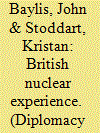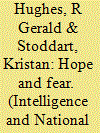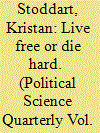|
|
|
Sort Order |
|
|
|
Items / Page
|
|
|
|
|
|
|
| Srl | Item |
| 1 |
ID:
114170


|
|
|
|
|
| Publication |
2012.
|
| Summary/Abstract |
Strategic culture, beliefs, and perceived status in an anarchic international system played a crucial role in the development of British nuclear weapons policy from its inception in the Second World War through to the Nassau Agreement in 1962 that provided Britain with a sophisticated submarine nuclear deterrent-Part Two, in the next issue of Diplomacy and Statecraft, will look at the period from 1962 to the present day. Adopting what has been described as a "Conventional Constructivist" approach, the argument is that these ideational factors have helped to shape the character of Britain's nuclear capability and the operational plans for the potential employment of those capabilities. It also provides an insight into how these factors have shaped elite views of the UK nuclear deterrent in the crucial early years of its development.
|
|
|
|
|
|
|
|
|
|
|
|
|
|
|
|
| 2 |
ID:
115096


|
|
|
|
|
| Publication |
2012.
|
| Summary/Abstract |
Part One of this article, which appeared in the last edition of Diplomacy and Statecraft, argued that the origins and early development of British nuclear weapons was largely driven by the particular ideas and beliefs of a relatively small political, scientific, and military elite. It is also argued that these beliefs, which developed into a "deterrence state of mind" amongst the elite, derived in part from a traditional strategic culture that emphasised the importance of producing the most sophisticated weapons of the day to protect Britain's diplomatic and security interests in a largely anarchic international system. Part Two argues that these ideational factors, based on a "realist" perspective of international security held by Britain's political-military leadership, have remained of crucial importance through to the present day.
|
|
|
|
|
|
|
|
|
|
|
|
|
|
|
|
| 3 |
ID:
155065


|
|
|
|
|
| Summary/Abstract |
This analysis examines NATO’s tactical/non-strategic nuclear weapons in the Cold War both for their perceived deterrent value against the Soviet Union and Warsaw Pact and as potential war fighting weapons. Within this debate lay questions related to extended deterrence, security guarantees, regional or theatre conflict, and escalatory potential. A central tenet that emerged in Europe was that nuclear weapons needed emplacement on the territory of non-nuclear NATO members to make deterrence more tangible. It raised huge questions of consultation. Once the Soviet Union had intercontinental missiles, the credibility of American readiness to use nuclear weapons in defence of its allies came into question. European alternatives and different consultation mechanisms to facilitate nuclear use became central to intra-NATO relations. Actively debated across NATO, they directly concerned above all the United States, Britain, and France—the nuclear weapons states in the NATO area—and West Germany, the potential main battleground in a Warsaw Pact invasion. Although dormant in NATO since the end of the Cold War, these issues will likely see revisiting in both Europe and other regional trouble spots.
|
|
|
|
|
|
|
|
|
|
|
|
|
|
|
|
| 4 |
ID:
116162


|
|
|
|
|
| Publication |
2012.
|
| Summary/Abstract |
This article explores a number of debates that have dominated intelligence studies since the terrorist attacks of 11 September 2001. It examines a number of inherent tensions, involving individuals and institutions, which threaten the long-term compatibility of the national security state with liberal democracy. The notion as to whether or not the use of extreme coercive measures (such as torture) can ever be justified is examined, as is the question as to whether such measures are self-defeating. The piece examines how liberal democracies seek to protect themselves in the light of rapid changes via a globalised media, the Information Revolution, and the proliferation of advanced technology and weapons of mass destruction amongst state and non-state actors. These issues are discussed with particular reference to the use of intelligence in Afghanistan, Iraq, Iran, North Korea and other global trouble spots. Finally, the article speculates on the future of the increasingly enmeshed relationship between policy-makers, intelligence agencies and the media. It is concluded that, without a clear agenda for the modification of the mechanisms for accountability and oversight, this triangular relationship will, despite its interdependence, be fraught with increasing difficulties.
|
|
|
|
|
|
|
|
|
|
|
|
|
|
|
|
| 5 |
ID:
149503


|
|
|
|
|
| Summary/Abstract |
KRISTAN STODDART describes the cybersecurity policies of the United States and the United Kingdom. He argues that both countries should address cyberattacks to critical national infrastructure by adopting internationally-oriented policies that include the private sector and civil society.
|
|
|
|
|
|
|
|
|
|
|
|
|
|
|
|
| 6 |
ID:
148455


|
|
|
|
|
| Summary/Abstract |
This article is intended to aid the UK government in protecting the UK from cyber attacks on its Critical National Infrastructure. With a National Cyber Security Centre now being established and an updated National Cyber Security Strategy due in 2016, it is vital for the UK government to take the right approach. This article seeks to inform this approach by outlining the scope of the problems Britain faces and what action the UK government is taking to combat these threats. In doing so, it offers a series of recommendations designed to further help mitigate these threats, drive up cyber resiliency and aid recovery plans should they be required. It argues that complete engagement and partnership with private sector owner–operators of Critical National Infrastructure are vital to the success of the government's National Cyber Security Strategy. It makes the case that for cyber resiliency to be fully effective, action is needed at national and global levels requiring states and private industry better to comprehend the threat environment and the risks facing Critical National Infrastructure from cyber attacks and those responsible for them. These are problems for all developed and developing states.
|
|
|
|
|
|
|
|
|
|
|
|
|
|
|
|
|
|
|
|
|